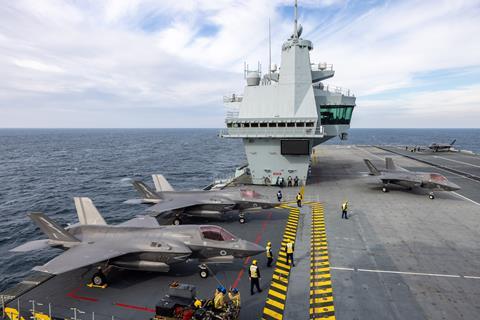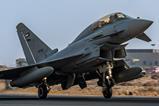The UK government’s Strategic Defence Review (SDR) process is poised to enter its next phase, following the completion of an initial consultation period.
Outlining the ongoing activity’s progress during a 3 December Defence Committee hearing, lead reviewer Lord Robertson said experts across 35 working groups recently completed the task of assessing submissions. Each has now prepared “out-notes” which will be subject of further review “next week”, he adds.
After the UK’s incoming Labour government launched the SDR activity in mid-year, some 14,500 expressions of interest were made, and 8,000 formal submissions received by the independent body tasked with completing the report.
Robertson describes this as a “quite remarkable process of consultation, with input from almost 100 think tanks and academic institutions, 200-plus from the supply chain, and from 30 nations”.
“We have now finished all of the review and challenge groups, and a lot of the conclusions are really quite remarkable and far-sighted in what they are telling us,” he says.

“We are looking out to 2030, 2040 as well – there is a long-term trajectory, but we are living within the [spending] envelope that has been laid down for the terms of reference,” Robertson notes. “By looking at every aspect of the defence enterprise, there are areas where we can see things can be done better, and can be done cheaper.
“What we are doing is quite novel and interesting – we don’t have to seek consensus,” notes Robertson, whose previous positions included UK secretary of state for defence and NATO secretary general. “We hope we will produce a model that other people will admire, and maybe even copy.”
While the review’s recommendations will not be released until during the first half of next year, Robertson notes: “If we have learned anything substantial from [the war in] Ukraine, it is that the supply of munitions, ammunition and other supplies that our armed forces are very short of have got to become part and parcel of the military effort.”
‘NATO FIRST’
And regarding the UK’s role in the 32-nation western military alliance, he says: “The whole military posture of NATO has changed, given the current prevailing situation in the world, and we are perfectly conscious of what is desired and wanted of this country.” However, he adds: “‘NATO first’ doesn’t mean NATO alone, because we have got other responsibilities.”
Meanwhile, with the UK set to increase its defence spending from just over 2% to 2.5% of gross domestic product, he stresses: “The Europeans need to do more inside NATO in order to carry more of the burden carried by the United States.”
“We remind ourselves every morning that every review in my working life has generally failed within two years [of publication],” fellow reviewer, retired General Sir Richard Barrons, told the committee. “They haven’t predicted what’s actually happened in the world.”
He singles out the SDR of 2010 as “the most powerful example of why they failed”, noting: “they left an enormous gap between ambition and resourcing, and an assumption that massive efficiencies would close that gap”.
With this in mind, “Our objective has to be as least wrong as possible in how we design a formula for the future,” he says. “It has to support credible deterrence in a resilient and enduring way.”
Barrons notes that with the SDR process being led by external reviewers, “Some in the department might think they can humour us and then go back to normal jockeying, but I see no sign of the government allowing that to happen – nor senior defence leadership.”
Previous UK review activities have exposed fierce inter-service rivalries and battling around available budgets.
An October report from the UK National Audit Office shows that the Ministry of Defence (MoD) spent £49 billion ($62 billion) in the 2023-2024 financial year. In December 2023, the spending watchdog said the MoD’s equipment plan for the coming 10 years faced a funding deficit of £16.9 billion.































